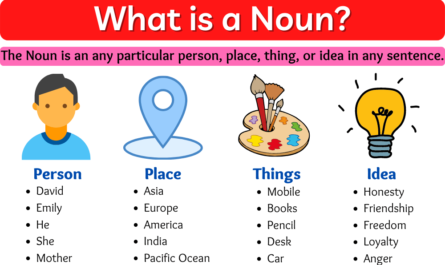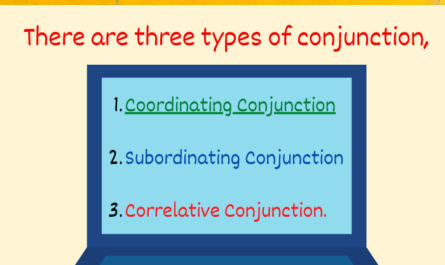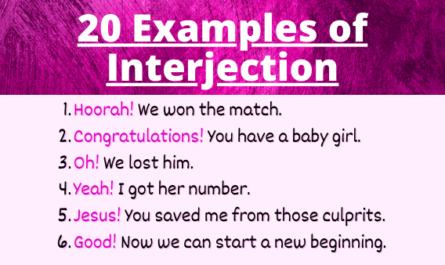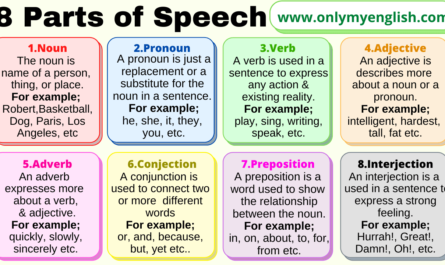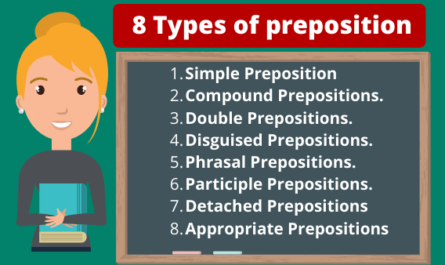Definition:
A word used to express the internal or sudden feelings like joy, sorrow, emotions, excitements in any sentence is called Interjection. There is no need for any grammatical adjustment with any other word for the interjections in a sentence.
Usually, interjections start with a capital letter and an exclamation sign.
- Alas, bravo, hurrah, ouch, hello, ahh, hush, etc.
Interjection are classified into three types with respect to the meaning and use in a sentence,
- A volitive interjection is used as an imperative/direct expression or demand for something to someone. “Shh!= Be Quiet!”
- An emotive interjection is used to show emotion like fear and disgust behaviour.
“Yuck!= Disgust!”
- A cognitive interjection is used to express feelings related to cognition.
“Wow! = Surprise!”
Based on the way of expressing feelings,
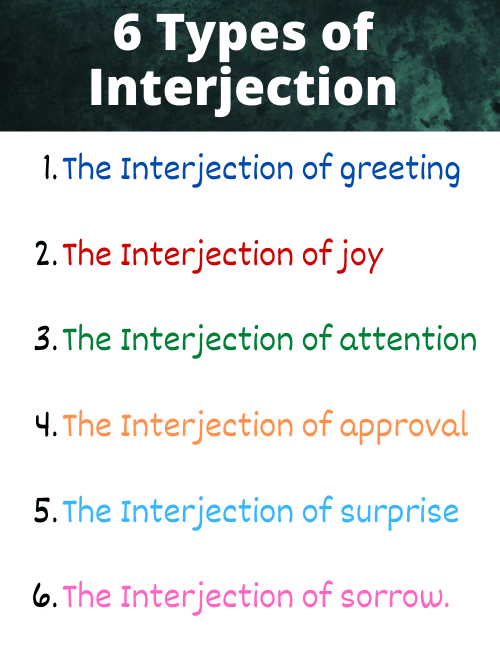
Interjections are six different types.
- The Interjection of greeting
- The Interjection of joy
- The Interjection of attention
- The Interjection of approval
- The Interjection of surprise
- The Interjection of sorrow.
#1. The Interjection of greeting:
The Interjection of greeting expresses the emotion of warmth to meet with any person.
- Hello!, hi!, hey! , etc.
Examples,
- Hey! What are you doing today?
- Hi! How are you?
- Hello! I’m Adam, your new professor.
#2. The Interjection of Joy:
The Interjection of joy is used to express the instantaneous pleasure and happiness on a particular occasion.
- Wow!, Hurrah!, Congratulations!, Good!, etc.
Examples,
- Good! Now we are going to the next level.
- Wow! You look so beautiful!
- Hurrah! We won the match!
- Congratulations! I wish you a happy married life!
#3. The Interjection of Attention:
The Interjection of attention is used to get someone’s attention towards us.
- Listen!, Look!, shh! , behold! , hush!, etc.
Examples,
- Look! I’m so tired today, and I won’t come anywhere with you.
- Behold! I saw something there in the corner.
- Shh! keep the mouth shut.
- Hush, Robin!, warned Smith.
- Yoo-hoo! Is anyone here?
#4. The Interjection of Approval:
The Interjection of approval used to express approval or any agreement in a sentence.
- Bravo!, Well done!, Brilliant!, etc.
Examples,
- Well done! You have completed the task successfully.
- Bravo! You spelled it correctly.
- He is a brilliant student at our college.
#5. The Interjection of surprise:
The Interjection of surprise used to express the feeling of surprise for any incident that has happened.
- Oh!, what!, Ah!, Ha!, etc.
Examples,
- Ah! I got my first salary.
- What! Are you serious?
- Oh! I met him yesterday.
- Ha! What a pleasant surprise.
#6. The Interjection of sorrow:
The Interjection for sorrow is used to express the emotion of sadness, that something terrible happened in a sentence.
- Ah!, Damm!, Alas!, Ouch!, oops!, etc.
Examples,
- Ouch! It’s hurting a lot.
- Alas! He got fractured in his right hand.
- Oops! Sorry. It was my fault.
- Help! I’m in big trouble.
